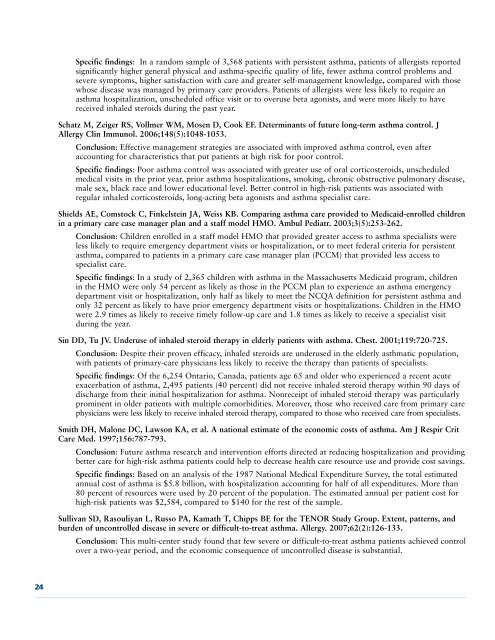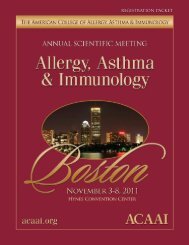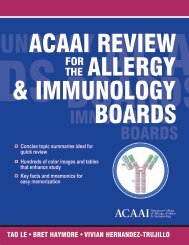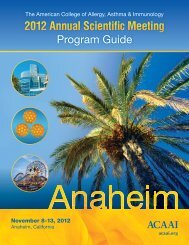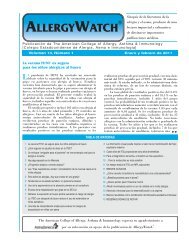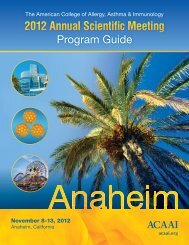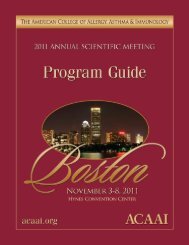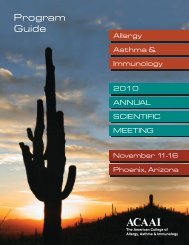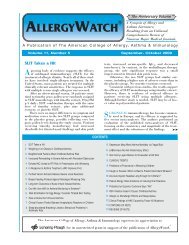Better Outcomes at Lower Cost - American College of Allergy ...
Better Outcomes at Lower Cost - American College of Allergy ...
Better Outcomes at Lower Cost - American College of Allergy ...
- No tags were found...
You also want an ePaper? Increase the reach of your titles
YUMPU automatically turns print PDFs into web optimized ePapers that Google loves.
Specific findings: In a random sample <strong>of</strong> 3,568 p<strong>at</strong>ients with persistent asthma, p<strong>at</strong>ients <strong>of</strong> allergists reportedsignificantly higher general physical and asthma-specific quality <strong>of</strong> life, fewer asthma control problems andsevere symptoms, higher s<strong>at</strong>isfaction with care and gre<strong>at</strong>er self-management knowledge, compared with thosewhose disease was managed by primary care providers. P<strong>at</strong>ients <strong>of</strong> allergists were less likely to require anasthma hospitaliz<strong>at</strong>ion, unscheduled <strong>of</strong>fice visit or to overuse beta agonists, and were more likely to havereceived inhaled steroids during the past year.Sch<strong>at</strong>z M, Zeiger RS, Vollmer WM, Mosen D, Cook EF. Determinants <strong>of</strong> future long-term asthma control. J<strong>Allergy</strong> Clin Immunol. 2006;148(5):1048-1053.Conclusion: Effective management str<strong>at</strong>egies are associ<strong>at</strong>ed with improved asthma control, even afteraccounting for characteristics th<strong>at</strong> put p<strong>at</strong>ients <strong>at</strong> high risk for poor control.Specific findings: Poor asthma control was associ<strong>at</strong>ed with gre<strong>at</strong>er use <strong>of</strong> oral corticosteroids, unscheduledmedical visits in the prior year, prior asthma hospitaliz<strong>at</strong>ions, smoking, chronic obstructive pulmonary disease,male sex, black race and lower educ<strong>at</strong>ional level. <strong>Better</strong> control in high-risk p<strong>at</strong>ients was associ<strong>at</strong>ed withregular inhaled corticosteroids, long-acting beta agonists and asthma specialist care.Shields AE, Comstock C, Finkelstein JA, Weiss KB. Comparing asthma care provided to Medicaid-enrolled childrenin a primary care case manager plan and a staff model HMO. Ambul Pedi<strong>at</strong>r. 2003;3(5):253-262.Conclusion: Children enrolled in a staff model HMO th<strong>at</strong> provided gre<strong>at</strong>er access to asthma specialists wereless likely to require emergency department visits or hospitaliz<strong>at</strong>ion, or to meet federal criteria for persistentasthma, compared to p<strong>at</strong>ients in a primary care case manager plan (PCCM) th<strong>at</strong> provided less access tospecialist care.Specific findings: In a study <strong>of</strong> 2,365 children with asthma in the Massachusetts Medicaid program, childrenin the HMO were only 54 percent as likely as those in the PCCM plan to experience an asthma emergencydepartment visit or hospitaliz<strong>at</strong>ion, only half as likely to meet the NCQA definition for persistent asthma andonly 32 percent as likely to have prior emergency department visits or hospitaliz<strong>at</strong>ions. Children in the HMOwere 2.9 times as likely to receive timely follow-up care and 1.8 times as likely to receive a specialist visitduring the year.Sin DD, Tu JV. Underuse <strong>of</strong> inhaled steroid therapy in elderly p<strong>at</strong>ients with asthma. Chest. 2001;119:720-725.Conclusion: Despite their proven efficacy, inhaled steroids are underused in the elderly asthm<strong>at</strong>ic popul<strong>at</strong>ion,with p<strong>at</strong>ients <strong>of</strong> primary-care physicians less likely to receive the therapy than p<strong>at</strong>ients <strong>of</strong> specialists.Specific findings: Of the 6,254 Ontario, Canada, p<strong>at</strong>ients age 65 and older who experienced a recent acuteexacerb<strong>at</strong>ion <strong>of</strong> asthma, 2,495 p<strong>at</strong>ients (40 percent) did not receive inhaled steroid therapy within 90 days <strong>of</strong>discharge from their initial hospitaliz<strong>at</strong>ion for asthma. Nonreceipt <strong>of</strong> inhaled steroid therapy was particularlyprominent in older p<strong>at</strong>ients with multiple comorbidities. Moreover, those who received care from primary carephysicians were less likely to receive inhaled steroid therapy, compared to those who received care from specialists.Smith DH, Malone DC, Lawson KA, et al. A n<strong>at</strong>ional estim<strong>at</strong>e <strong>of</strong> the economic costs <strong>of</strong> asthma. Am J Respir CritCare Med. 1997;156:787-793.Conclusion: Future asthma research and intervention efforts directed <strong>at</strong> reducing hospitaliz<strong>at</strong>ion and providingbetter care for high-risk asthma p<strong>at</strong>ients could help to decrease health care resource use and provide cost savings.Specific findings: Based on an analysis <strong>of</strong> the 1987 N<strong>at</strong>ional Medical Expenditure Survey, the total estim<strong>at</strong>edannual cost <strong>of</strong> asthma is $5.8 billion, with hospitaliz<strong>at</strong>ion accounting for half <strong>of</strong> all expenditures. More than80 percent <strong>of</strong> resources were used by 20 percent <strong>of</strong> the popul<strong>at</strong>ion. The estim<strong>at</strong>ed annual per p<strong>at</strong>ient cost forhigh-risk p<strong>at</strong>ients was $2,584, compared to $140 for the rest <strong>of</strong> the sample.Sullivan SD, Rasouliyan L, Russo PA, Kam<strong>at</strong>h T, Chipps BE for the TENOR Study Group. Extent, p<strong>at</strong>terns, andburden <strong>of</strong> uncontrolled disease in severe or difficult-to-tre<strong>at</strong> asthma. <strong>Allergy</strong>. 2007;62(2):126-133.Conclusion: This multi-center study found th<strong>at</strong> few severe or difficult-to-tre<strong>at</strong> asthma p<strong>at</strong>ients achieved controlover a two-year period, and the economic consequence <strong>of</strong> uncontrolled disease is substantial.24


